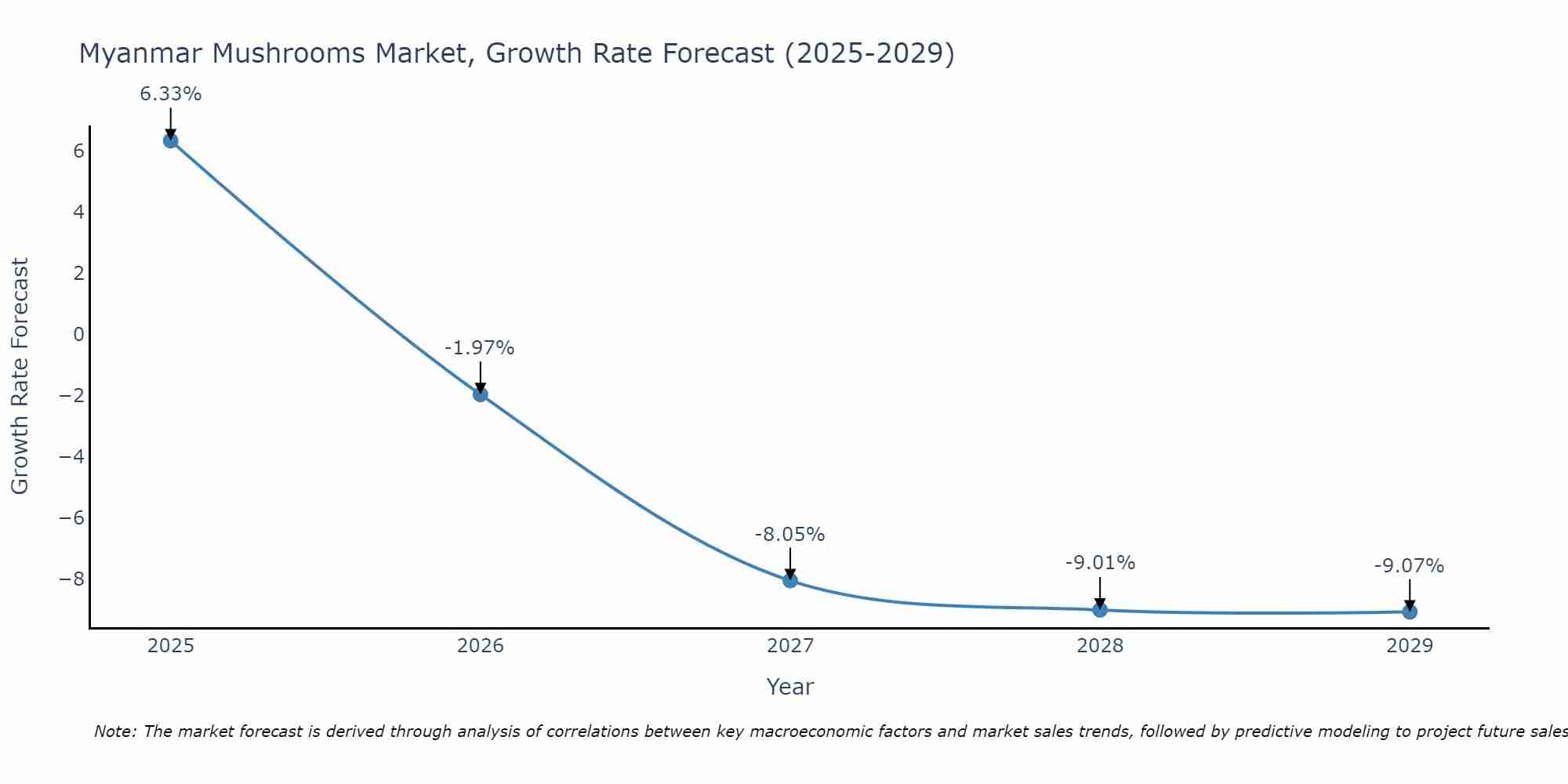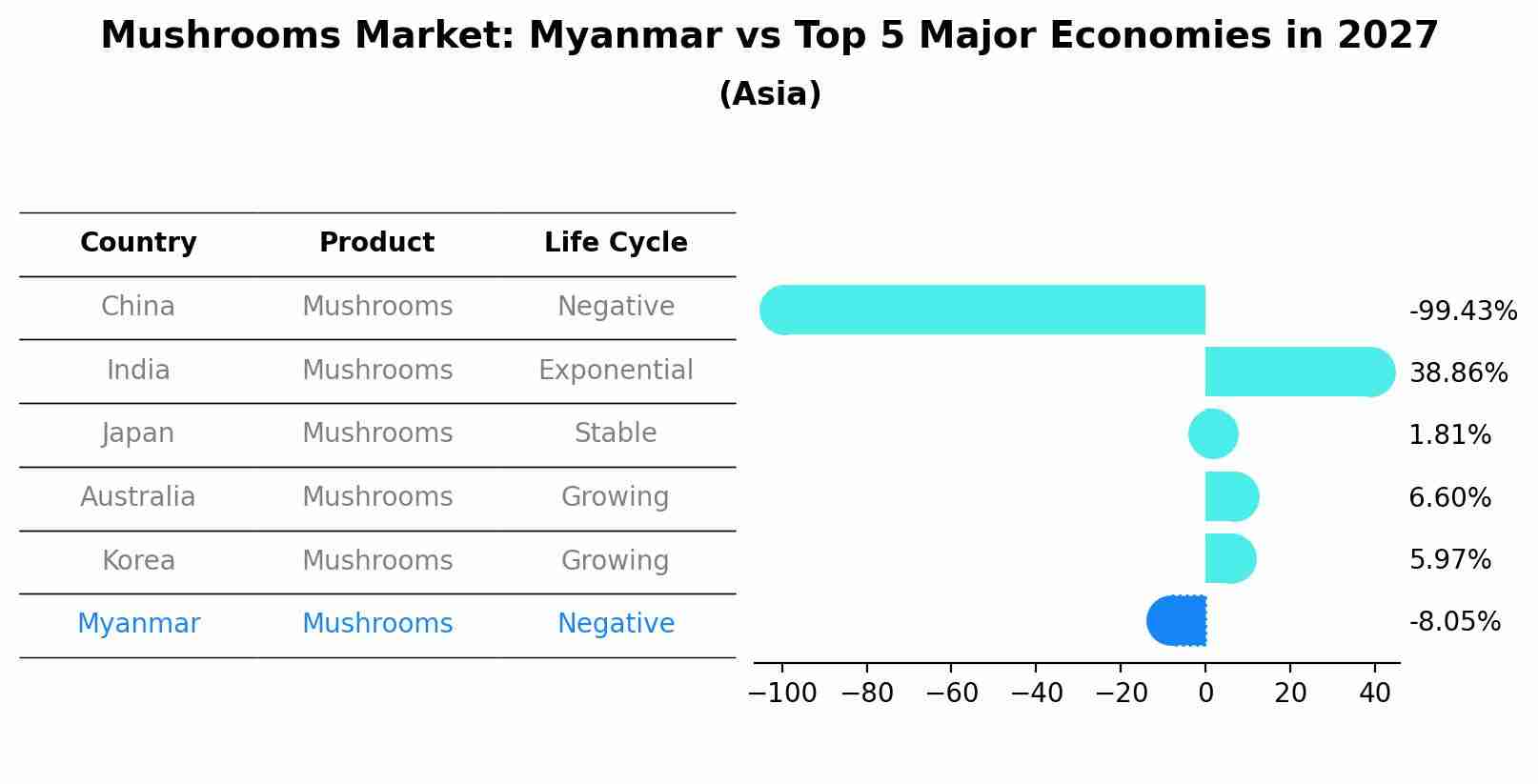Myanmar Mushrooms Market (2025-2031) Outlook | Industry, Revenue, Companies, Trends, Value, Analysis, Share, Growth, Size & Forecast
| Product Code: ETC383194 | Publication Date: Aug 2022 | Updated Date: Jul 2025 | Product Type: Market Research Report | |
| Publisher: 6Wresearch | Author: Dhaval Chaurasia | No. of Pages: 75 | No. of Figures: 35 | No. of Tables: 20 |
Myanmar Mushrooms Market Size Growth Rate
The Myanmar Mushrooms Market could see a tapering of growth rates over 2025 to 2029. Starting high at 6.33% in 2025, the market steadily declines to -9.07% by 2029.

Mushrooms Market: Myanmar vs Top 5 Major Economies in 2027 (Asia)
By 2027, the Mushrooms market in Myanmar is anticipated to reach a growth rate of -8.05%, as part of an increasingly competitive Asia region, where China remains at the forefront, supported by India, Japan, Australia and South Korea, driving innovations and market adoption across sectors.

Myanmar Mushrooms Market Synopsis
The Myanmar mushrooms market is experiencing steady growth driven by increasing consumer awareness of the health benefits associated with mushrooms consumption. Oyster mushrooms, shiitake mushrooms, and straw mushrooms are commonly cultivated and consumed in Myanmar. The market is primarily dominated by local producers who cater to both the domestic and export markets. With a rich agricultural landscape and favorable climate conditions for mushroom cultivation, Myanmar has the potential to further expand its market presence. Factors such as rising disposable incomes, changing dietary preferences, and a growing trend towards plant-based diets are expected to drive the demand for mushrooms in the country. However, challenges related to infrastructure development, quality control, and marketing strategies need to be addressed to fully capitalize on the market`s potential.
Myanmar Mushrooms Market Trends
The Myanmar mushrooms market is experiencing growth driven by increasing consumer awareness of the nutritional benefits and versatility of mushrooms. There is a rising demand for exotic and specialty mushroom varieties such as shiitake, oyster, and lion`s mane due to their unique flavors and health properties. Domestic production is expanding to meet this demand, with a focus on sustainable cultivation practices. Additionally, there is a growing interest in value-added mushroom products like powders, extracts, and snacks. The market is also seeing a shift towards organic and locally sourced mushrooms, reflecting consumers` preferences for healthy and environmentally friendly options. Overall, the Myanmar mushrooms market is on a positive trajectory, with opportunities for further innovation and market expansion.
Myanmar Mushrooms Market Challenges
In the Myanmar mushrooms market, there are several challenges that impact the industry`s growth. Lack of proper infrastructure and technology for cultivation and distribution hinders the efficiency and scale of production. Inconsistent quality standards and limited access to international markets restrict the potential for export growth. Additionally, the presence of counterfeit products and unregulated practices undermine consumer trust and the reputation of the industry. Furthermore, the industry faces challenges related to climate change, such as unpredictable weather patterns affecting crop yields. Addressing these challenges will require investments in technology, quality control measures, market access strategies, and sustainability practices to ensure the long-term growth and competitiveness of the Myanmar mushrooms market.
Myanmar Mushrooms Market Investment Opportunities
The Myanmar mushrooms market presents various investment opportunities for both domestic and international investors. With a growing demand for mushrooms due to their nutritional benefits and versatility in cooking, there is potential for investment in mushroom cultivation and processing facilities. Additionally, the rise of health-conscious consumers in Myanmar creates opportunities for value-added mushroom products like mushroom powders, extracts, and supplements. Investing in technology and innovation for sustainable mushroom farming practices can also be a lucrative opportunity in the market. Furthermore, the expanding tourism industry in Myanmar provides a platform for marketing and selling specialty mushrooms to hotels, restaurants, and tourists. Overall, the Myanmar mushrooms market offers a range of investment possibilities for those looking to capitalize on the increasing popularity of mushrooms in the country.
Jordan Agar Market Government Policies
Government policies related to the Myanmar mushrooms market focus on promoting sustainable cultivation practices, ensuring food safety standards, and facilitating export opportunities. The government has implemented initiatives to support smallholder farmers in adopting modern techniques for mushroom cultivation, providing training programs and financial assistance. Additionally, regulatory measures are in place to monitor and enforce food safety standards to protect consumer health. To boost exports, the government has established trade agreements and partnerships with international markets, streamlining customs procedures and offering incentives for mushroom producers. Overall, the government`s policies aim to drive growth in the Myanmar mushrooms market by fostering a conducive environment for production, ensuring quality control, and expanding market access for local growers.
Myanmar Mushrooms Market Future Outlook
The Myanmar mushrooms market is poised for growth in the coming years due to increasing consumer awareness of the health benefits associated with mushrooms and a growing interest in plant-based diets. Additionally, the rise of urban agriculture and sustainable farming practices in the country is expected to boost local mushroom production, thus driving market expansion. The demand for mushrooms is also likely to be influenced by the rising culinary trends emphasizing unique and exotic ingredients. However, challenges such as limited technological advancements in mushroom cultivation and distribution infrastructure may hinder market growth. Overall, with favorable market trends and increasing consumer demand, the Myanmar mushrooms market is anticipated to experience steady growth in the foreseeable future.
Key Highlights of the Report:
- Myanmar Mushrooms Market Outlook
- Market Size of Myanmar Mushrooms Market, 2024
- Forecast of Myanmar Mushrooms Market, 2031
- Historical Data and Forecast of Myanmar Mushrooms Revenues & Volume for the Period 2021 - 2031
- Myanmar Mushrooms Market Trend Evolution
- Myanmar Mushrooms Market Drivers and Challenges
- Myanmar Mushrooms Price Trends
- Myanmar Mushrooms Porter's Five Forces
- Myanmar Mushrooms Industry Life Cycle
- Historical Data and Forecast of Myanmar Mushrooms Market Revenues & Volume By Product for the Period 2021 - 2031
- Historical Data and Forecast of Myanmar Mushrooms Market Revenues & Volume By Button for the Period 2021 - 2031
- Historical Data and Forecast of Myanmar Mushrooms Market Revenues & Volume By Shiitake for the Period 2021 - 2031
- Historical Data and Forecast of Myanmar Mushrooms Market Revenues & Volume By Oyster for the Period 2021 - 2031
- Historical Data and Forecast of Myanmar Mushrooms Market Revenues & Volume By Matsutake for the Period 2021 - 2031
- Historical Data and Forecast of Myanmar Mushrooms Market Revenues & Volume By Truffles for the Period 2021 - 2031
- Historical Data and Forecast of Myanmar Mushrooms Market Revenues & Volume By Other for the Period 2021 - 2031
- Historical Data and Forecast of Myanmar Mushrooms Market Revenues & Volume By Form for the Period 2021 - 2031
- Historical Data and Forecast of Myanmar Mushrooms Market Revenues & Volume By Fresh for the Period 2021 - 2031
- Historical Data and Forecast of Myanmar Mushrooms Market Revenues & Volume By Processed for the Period 2021 - 2031
- Historical Data and Forecast of Myanmar Mushrooms Market Revenues & Volume By Distribution Channel for the Period 2021 - 2031
- Historical Data and Forecast of Myanmar Mushrooms Market Revenues & Volume By Direct to Customer for the Period 2021 - 2031
- Historical Data and Forecast of Myanmar Mushrooms Market Revenues & Volume By Grocery Stores for the Period 2021 - 2031
- Historical Data and Forecast of Myanmar Mushrooms Market Revenues & Volume By Supermarkets & Hypermarkets for the Period 2021 - 2031
- Historical Data and Forecast of Myanmar Mushrooms Market Revenues & Volume By Convenience Stores for the Period 2021 - 2031
- Historical Data and Forecast of Myanmar Mushrooms Market Revenues & Volume By Online Stores for the Period 2021 - 2031
- Historical Data and Forecast of Myanmar Mushrooms Market Revenues & Volume By Application for the Period 2021 - 2031
- Historical Data and Forecast of Myanmar Mushrooms Market Revenues & Volume By Food for the Period 2021 - 2031
- Historical Data and Forecast of Myanmar Mushrooms Market Revenues & Volume By Pharmaceutical for the Period 2021 - 2031
- Historical Data and Forecast of Myanmar Mushrooms Market Revenues & Volume By Cosmetics for the Period 2021 - 2031
- Myanmar Mushrooms Import Export Trade Statistics
- Market Opportunity Assessment By Product
- Market Opportunity Assessment By Form
- Market Opportunity Assessment By Distribution Channel
- Market Opportunity Assessment By Application
- Myanmar Mushrooms Top Companies Market Share
- Myanmar Mushrooms Competitive Benchmarking By Technical and Operational Parameters
- Myanmar Mushrooms Company Profiles
- Myanmar Mushrooms Key Strategic Recommendations
Frequently Asked Questions About the Market Study (FAQs):
- Single User License$ 1,995
- Department License$ 2,400
- Site License$ 3,120
- Global License$ 3,795
Search
Thought Leadership and Analyst Meet
Our Clients
Related Reports
- Afghanistan Rocking Chairs And Adirondack Chairs Market (2026-2032) | Size & Revenue, Competitive Landscape, Share, Segmentation, Industry, Value, Outlook, Analysis, Trends, Growth, Forecast, Companies
- Afghanistan Apparel Market (2026-2032) | Growth, Outlook, Industry, Segmentation, Forecast, Size, Companies, Trends, Value, Share, Analysis & Revenue
- Canada Oil and Gas Market (2026-2032) | Share, Segmentation, Value, Industry, Trends, Forecast, Analysis, Size & Revenue, Growth, Competitive Landscape, Outlook, Companies
- Germany Breakfast Food Market (2026-2032) | Industry, Share, Growth, Size, Companies, Value, Analysis, Revenue, Trends, Forecast & Outlook
- Australia Briquette Market (2025-2031) | Growth, Size, Revenue, Forecast, Analysis, Trends, Value, Share, Industry & Companies
- Vietnam System Integrator Market (2025-2031) | Size, Companies, Analysis, Industry, Value, Forecast, Growth, Trends, Revenue & Share
- ASEAN and Thailand Brain Health Supplements Market (2025-2031) | Strategy, Consumer Insights, Analysis, Investment Trends, Opportunities, Growth, Size, Share, Industry, Revenue, Segments, Value, Segmentation, Supply, Forecast, Restraints, Outlook, Competition, Drivers, Trends, Demand, Pricing Analysis, Competitive, Strategic Insights, Companies, Challenges
- ASEAN Bearings Market (2025-2031) | Strategy, Consumer Insights, Analysis, Investment Trends, Opportunities, Growth, Size, Share, Industry, Revenue, Segments, Value, Segmentation, Supply, Forecast, Restraints, Outlook, Competition, Drivers, Trends, Demand, Pricing Analysis, Competitive, Strategic Insights, Companies, Challenges
- Europe Flooring Market (2025-2031) | Outlook, Share, Industry, Trends, Forecast, Companies, Revenue, Size, Analysis, Growth & Value
- Saudi Arabia Manlift Market (2025-2031) | Outlook, Size, Growth, Trends, Companies, Industry, Revenue, Value, Share, Forecast & Analysis
Industry Events and Analyst Meet
Whitepaper
- Middle East & Africa Commercial Security Market Click here to view more.
- Middle East & Africa Fire Safety Systems & Equipment Market Click here to view more.
- GCC Drone Market Click here to view more.
- Middle East Lighting Fixture Market Click here to view more.
- GCC Physical & Perimeter Security Market Click here to view more.
6WResearch In News
- Doha a strategic location for EV manufacturing hub: IPA Qatar
- Demand for luxury TVs surging in the GCC, says Samsung
- Empowering Growth: The Thriving Journey of Bangladesh’s Cable Industry
- Demand for luxury TVs surging in the GCC, says Samsung
- Video call with a traditional healer? Once unthinkable, it’s now common in South Africa
- Intelligent Buildings To Smooth GCC’s Path To Net Zero


















